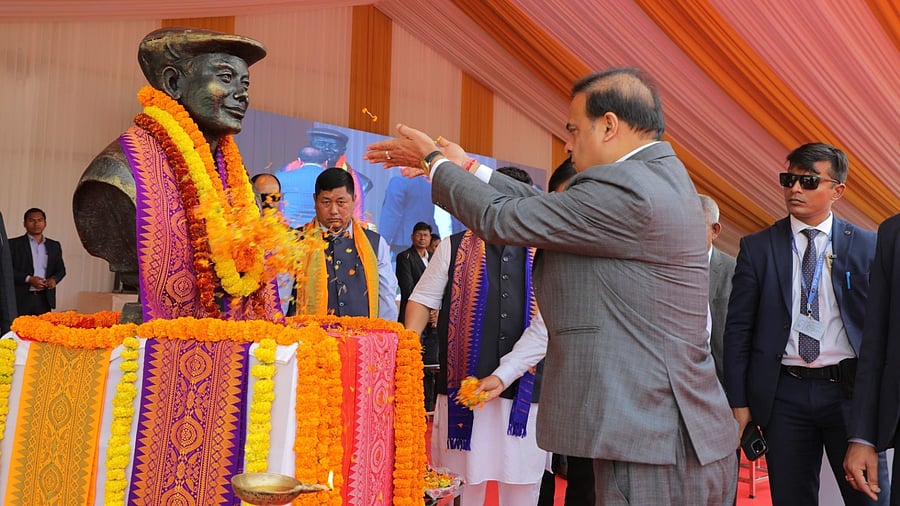
Assam CM Himanta Biswa Sarma offering garlands at the statue of Upendra Nath Brahma, the father of the Bodo community, in Kokrajhar on Tuesday.
Credit: Assam government
Guwahati: Once a "hideout" for insurgents operating in western Assam's Bodoland, Bhutan now has become a hope to usher more development in the region that saw an end to its decades-long insurgency problem with the signing of a new Bodoland Accord five years ago.
With India planning to connect Gelephu, a town in Bhutan with Chirang in Bodoland, the Assam government hopes to increase economic activities between the two nations, with focus on Bodoland.
Addressing an event to celebrate five years of Bodoland Accord, at Kokrajhar, Chief Minister Himanta Biswa Sarma on Tuesday hoped that Bodoland is expected to reap benefits of Bhutan's plan to upgrade and transform Gelephu into a "Mindfullness city" to promote tourism and business. Kokrajhar is the headquarters of Bodoland Territorial Region (BTR), comprising four districts, Chirang, Kokrajhar, Baksa and Udalguri.
"We want Bodoland region to reap benefits of the Bhutan's Mindfulness city. So the government is planning to connect Gelephu and Chirang by a train line. Union Railway Minister Ashwini Vaishnaw is likely to make a positive announcement about the project during the Assam investment summit we are organising on February 25 and 26 in Guwahati. We are also planning to introduce a Vande Bharat-like train so that a commuter can reach Guwahati from Chirang in two-hours," Sarma said. Train journey between Chirang and Guwahati takes about five hours now.
The region has about 35 lakh population and is governed by Bodoland Territorial Council (BTC), an autonomous council set up under the Sixth Schedule of the Constitution.
The BTC was the outcome of a Bodoland Accord, which was signed in 2003 after Bodo Liberation Tigers (BLT), a now disbanded insurgent group, had laid down weapons and joined the mainstream. A large number of BLT cadres and leaders had taken shelter in Bhutan but were flushed out of the Himalayan nation between 2002-2003.
But insurgency did not end with factions of the National Democratic Front of Bodoland (NDFB) and some other groups run by Adivasi youths continuing the "armed fight for Liberation." The insurgency, however, ended with the signing of the new Bodoland Accord on January 27, 2020. All rebel groups were disbanded.
"Since the new Accord was signed five years ago, the atmosphere in Bodoland has seen massive turnaround. People no longer are worried about bomb blasts and guns. Kokrajhar have successfully organised a literary festival, a knowledge Conclave, Durand Cup and Santosh Trophy football. People now wants more schools, colleges, universities and jobs. The BTR now have two medical colleges, one in Kokrajhar and another to be inaugurated in Tamulpur, two full-fledged universities have been set up. A knowledge movement has replaced the armed movement for autonomy and division," Sarma said.
"We have rehabilitated 4,203 former insurgents and provided assistance to the family members of the martyrs of Bodoland movement," he added.
BJP and United People's Party Liberal (UPPL), a regional party, are in power of BTC since 2020. Sarma said the two parties are also likely to contest the next BTC elections scheduled later this year, together.
Pramod Boro, Chief of BTC and UPPL head said massive development work is going on to improve infrastructure and create jobs in BTR.